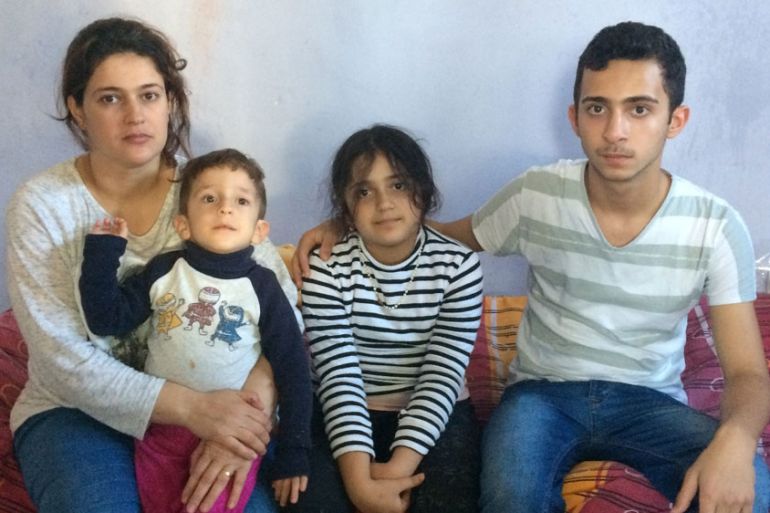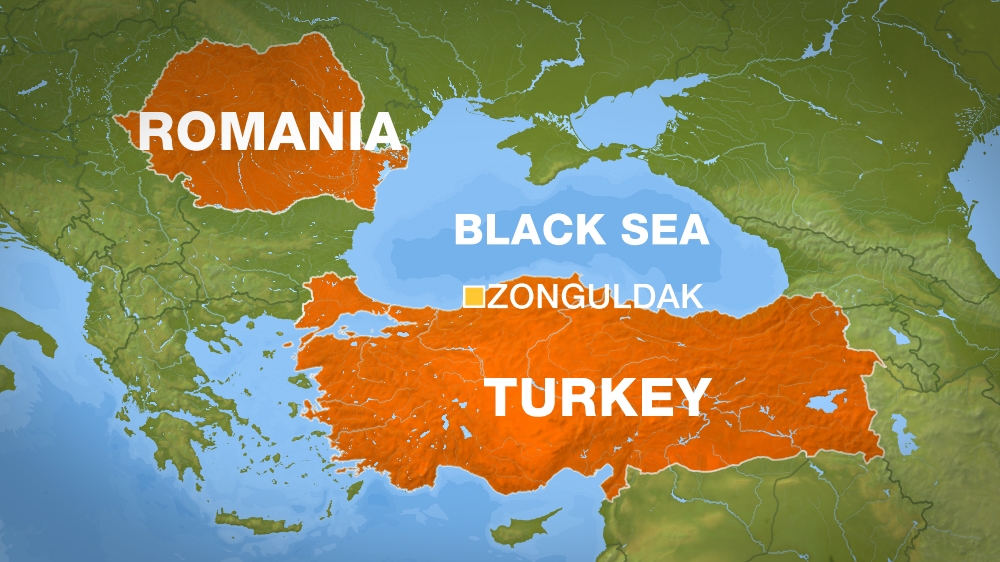Refugees ‘tolerated’ after crossing deadly Black Sea
After travelling to Romania from Turkey via the dangerous Black Sea, refugees and migrants struggle to survive.

Names marked with an asterisk* have been changed to protect the identities of the migrants quoted in this piece.
Bucharest, Romania – In a small yard of an old Bucharest building, 24-year-old Sitna* barely moves. She is pregnant, waiting to deliver at any moment.
Keep reading
list of 4 itemsUN report charts lethal cost of migration over past decade
Conflict, climate, corruption drive Southeast Asia people trafficking: UN
Bodies of three Rohingya found as Indonesia ends rescue for capsized boat
Along with her husband and their two-year-old daughter, she travelled from Iraq to Romania on the Black Sea, on a ship that was saved from capsizing by Romanian Border Police.
“They lied, they said we would be 80 people, and in the end we were over 150, the guide lied to us. I felt like I was dying there because there was no oxygen,” she said.
The family had been living in a village in the Kurdish region of Iraq, but life took a turn for the worse when her husband Mohammed* took a job at a Yazidi religious centre.
Most Yazidis are Kurdish, and their ancient religion, Yazidism, is derived in part from Christianity.
“We are Muslims and our families, especially my wife’s brothers, didn’t accept this. They said ‘How can you take money from them?’ And for this reason, I said we better go instead of being killed,” said Mohammed.
The family left Iraq and entered Turkey with a legal visa. There, they contacted a smuggler who offered them accommodation for a month and six days.
In September, they embarked on a boat to Romania on the Black Sea.
Most refugees and migrants have been using the Mediterranean to escape deadly violence and persecution, often both. But the Black Sea route, which has worse weather conditions and is considered more dangerous, continues to be tested by smugglers.
As recently as the night of November 27, Romanian Border Police said at least 60 people, including 24 children, from Iraq, Pakistan and Afghanistan, were rescued when winds became strong. In September, at least 21 people drowned when a boat capsized.
‘I thought I was going to die’
Sitna said she wanted to get off the boat because she was sick, but smugglers in Turkey did not allow her.
“I thought I was going to die, especially because I was pregnant. Even in the engine room, there were 13 people. Only the toilets were empty,” she says.
“There were many sick people, pregnant women, newborn babies. Three women were pregnant and two others had just given birth, there was an old lady who had no legs and a boy who didn’t have a leg.”
The “big boss”, as Mohammed calls the smuggler, was not on the boat.
There were six Turkish “guides”, each accompanying his group of migrants, who “knew the way”, said Mohammed. However, they almost got lost.
By the time of publishing, Turkish authorities had not responded to Al Jazeera’s request for comment.
“The journey took three nights and two days, because they went wrong. We were going to Russia. For 13 hours we were in Russian water,” says Mohammed.
“We were eating an apple a day and water. Everything I was eating, I was vomiting. And we were running out of water. It was the first time we were on a boat, it was windy and I was afraid for the baby,” Sitna says.
The journey took three nights and two days, because they went wrong. We were going to Russia. For 13 hours, we were in Russian water.
On the morning of September 12, according to a press release from the Romanian Border Police, “the ship sent SOS signals, with conditions of extreme weather [strong wind and five degrees waves].”
Mohammed says it took the police nine hours to pull the boat onto shore.
The smugglers were arrested and the migrants were detained in centres for foreigners.
‘Tolerated’ in Romania
Sitna and Mohammed were sent to Arad, western Romania. After five days they were released because she was pregnant. They now have the status of “tolerated”.
“The tolerated status allows people to remain in the territory of that country. It is given for six months, with the possibility to be renewed,” said Maria Voica, project coordinator at the International Organization for Migration (IOM) in Romania.
“There is not enough information to give an international form of protection, but at the same time, there is a reserve that if the person returns to the territory of the state of origin, his life could be in danger.”
Mohammed said he left Iraq in the hope of being accepted by “any country”.

“We paid 5,000 euro for the boat to Romania. We didn’t have more money. Some, who had money, paid from Turkey to go to the West. There are guides who guarantee you, for up to 7,500 euro, to Germany.”
They now live at a centre run by the Jesuit Refugee Service Romania (JRS) NGO, which houses 22 people in total.
“It doesn’t have ideal conditions, but we don’t have money to reconfigure it,” says Catalin Albu, JRS head.
JRS is the only centre offering accommodation for those with toleration stay in Romania.
The organisation wanted to build another in Romania’s north, but locals did not want migrants in the area.
Albu said migrants generally do not want to stay in Romania because the country “doesn’t offer them much”.
Some have had “tolerated” status for 10 years, she said.
“There is no financial support, no doctors help you,” said Sitna, who considered returning to Iraq to give birth.
‘My country, Iraq, for me is something black’
Rebaz Taqana, a 35-year-old Kurdish car mechanic and taxi driver from Iraq, also lives at the centre with his wife and three children, with the status of “tolerated”.
They entered Romania by the Black Sea, three days earlier than Sitna, with a boat carrying 97 migrants.
The family paid 11,000 euro to smugglers to take the boat from Turkey to Romania, having paid 2,000 euro to cross the border from Iraq to Turkey.
“My country, Iraq, for me is something black, it is no longer important. There is no life there, they have guns, and they sell them in the street, the cars go without registration plates and they can do anything. Every day you hear someone died,” he said.
His youngest child, two-year-old Cohar, has just one kidney. A doctor in Iraq said he should be operated on by the age of four.
“I wanted to get to Germany to help the child. We could have died [on the boat], because we wanted to help the baby,” says Rawef, Cohar’s mother.
![Rebaz Taqana, right, is a Kurdish Iraqi and says his home country is too dangerous to raise his family [Courtesy: Taqana family]](/wp-content/uploads/2017/12/aab92c910f954dba9650c344672f9e79_18.jpeg)
Gabriela Leu, UNHCR Romania spokesperson, said children are entitled to receive medical care regardless of their insurance status, and tolerated people have the right to work in Romania.
“We don’t have an answer from the doctors, we don’t know what’s next,” Rebaz said, adding he had applied for asylum but was rejected. A second rejection would lead to their deportation.
Iranian Khabat Ahmadi, 37, travelled on the boat with Rebaz, and claims smugglers promised him they “had a relationship with police” and that a truck would take them to Germany.
But Khabat was detained by police, in addition to the 472 migrants and refugees from Iraq and Iran who arrived in August and September via the Black Sea.
What we offer them is a small bandage for a big wound ... At this point I can't tell you what will happen to them.
Alexandra Popescu, Romanian Police spokesperson, said “between 2013 and 2014 and in February 2015, border police detected about 500 people who tried to enter Romania illegally on the Black Sea. Until August this year, there were no other cases of illegal migration.”
At least 4,600 people in 2017 have tried to cross the border illegally to Romania, Popescu said, adding that 2,200 tried to enter and 2,400 attempted to leave.
Khabat now lives at a centre for asylum seekers in Bucharest, run by the General Inspectorate for Immigration.
“We have bugs, it’s not clean. I was told that if I apply for asylum, I am free. I had enough of staying in a closed centre and this is why I applied,” he said.
Khabat said he was in danger in Iran because, as well as running a clothes shop, he worked for the communist party and fought for rights for the Kurdish population.
His wife and his 17-year-old son stayed in Iran.
It took him three months and 10 days to reach Romania, paying smugglers almost 14,000 euro to cross the border to Turkey.
He had attempted to travel to Italy and cross the border to Bulgaria and Greece, but was repeatedly caught.
“When they caught me, I said I was from Syria and nothing happened,” he said. “For me, life was very good there [in Iran] … But I have problems and that’s why I came here and I want one day to go back there.”
![Turkish gendarmes load the coffin of a drowned migrant into a van in Kocaeli on September 22, 2017. Four people drowned and up to 20 were missing on September 22 after a fishing boat carrying migrants sunk off Turkey's Black Sea coast [AFP/Dogan news agency]](/wp-content/uploads/2017/09/e1397a0724404387b4519bbede2bfcac_18.jpeg)
According to the General Inspectorate for Immigration, 331 migrants who arrived via the Black Sea in 2017 have applied for international protection in Romania.
The IOM’s Voica said up to 90 percent of Syrians are usually successful in asylum applications, followed by Iraqis, Afghans and lastly Pakistanis.
With regards to the tolerated, Albu, of the NGO JRS, said: “What we offer them is a small bandage for a big wound … At this point I can’t tell you what will happen to them.”